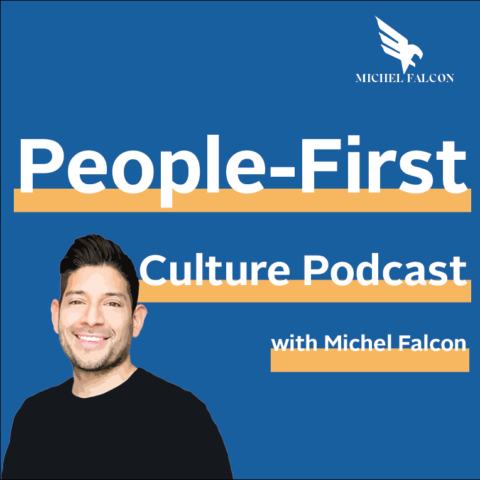To listen to this episode on an Apple device, click here.
To listen on Spotify, click here.
To listen to this episode on another platform, click here.
Hey, everyone. Welcome to the People-First Culture podcast. I am Michel Falcon. This is episode number 12, The Best Marketing is Bad Customer Service. I will unpack that in just one moment, but before that, I will extend an apology for the frequency of the podcast. I am trying to manage everything in my life, probably similar to you. We’ve got several Brasa Peruvian Kitchen locations opening at once, we’re growing the team, making sure that product stays fantastic, I’m starting to speak a little bit more. So I’ve got a lot of my plate, but I am going to continue to put forth effort to make this podcast a regular thing, where I will release one episode per week, so bear with me. I appreciate you coming back to listen. The best way to be notified when I release an episode is to go to michelfalcon.com, and subscribe to my email list. Many others have. I’m biased, of course, but I believe we deliver fantastic education and content for entrepreneurs and individuals that work within companies that want to make a real impact and grow their careers and themselves.
And this episode is one that I’ve been thinking about releasing for a while, and if you know how I operate, I will not share advice until I’ve had valuable experience with it. Let me give you an example, and I will always share tactical things with real-world examples that I’ve had experience with, with my own two hands. Brasa Peruvian Kitchen is a fast casual restaurant concept started here in Toronto, with ambition to go throughout North America. I do believe the best form of marketing can be bad customer service. Now, here’s why.
As a consumer, when you are delivered bad customer service or a bad product, you may hesitate to complain to the company to seek reimbursement or some sort of refund. The reason why you may hesitate to that, is because it’s putting salt into the wound. Most companies do not handle customer retention well. So if you complain, or ask for a refund, or give feedback, that may fall on deaf ears, or it may be greeted with pushback from the company. Some organizations may interrogate you, “When did you buy it? How did it break? What do you mean you didn’t like the flavors?”
And that’s off-putting for the customer because not only did you not get what you expected, but now you’re having to explain yourself, almost like you’re on trial. That’s part of the reason why consumers won’t say anything. However, they’re saying something to someone, and that’s often their friends and family members in private, or maybe they’re leaving bad Google reviews, or going to Yelp, or any type of social network like Twitter, but often, they don’t go directly to the company, because the company does not make it easy for the customer to complain, give feedback, or seek reimbursement.
Not only this, the company doesn’t have service level agreements in place. Let me explain. A service level agreement, or an SLA, is an internal rule within an organization. For example, at Brasa Peruvian Kitchen, whenever somebody gives us feedback, whether it’s positive or negative, we respond to every piece of feedback within one business day maximum. We run to people that give us one, or two, or three stars on Uber Eats when they give us feedback. Thankfully, we’ve only received one one star rating, with over hundreds of reviews, so I’m thankful for that, but we respond to every positive comment as well within one business day. That’s our service level agreement, good or bad. Now, we will want to improve one day. That will likely be one business hour, as we grow our team, but we have set a precedent with our customers that we will always respond to everything that you tell us. Even if we don’t necessarily see eye to eye with the commentary, we will still respond and try to understand the feedback from the customer.
Not only this, companies haven’t properly been trained how to retain their customers, what type of language to use. It shouldn’t sound like an interrogation when somebody gives you feedback that you might not like. Now, I’m not suggesting that every customer is right. I do not subscribe to the customer is always right, but I will subscribe and advocate that you must always reach out to them. Let me share an example with you.
The other day, a customer of ours ordered through our website. She ordered two bowls, both with proteins. One had chicken, one had mushroom. I received a notification on my phone, after the customer had visited our website, after their food arrived, to notify me that we failed to put mushrooms on one of her bowls. Now, I never verified whether that was true or not. I didn’t care. I’m going to take the customer at their word that we did not put mushrooms on her bowl that she had paid for.
So what I did immediately was I alerted our team, I made sure that we made her a new bowl. I called an Uber courier, and we sent it over to the customer. I communicated with the customer in real time, within minutes of her responding, and let her know what we were willing to do. I then went further. I reimbursed her whole meal. It was about $37, and that’s what blew her away. I did not need to do this, I think she would’ve just been content with receiving another bowl with her mushrooms, but I wanted to, as the saying goes, “Go above and beyond,” and give the customer something to share.
Now, I’m happy you to say that she did end up leaving us a five star Google review. She noted that we failed to put mushrooms on her bowl. Now, some companies might be upset that that was mentioned, but I’m happy that she mentioned that, because now we are on stage, we’re on display of how we recover after suboptimum customer experience. That is our marketing. I’m not going to say that I want us to make mistakes, but it’s not going to bother me if we do, if it’s here and there, right? We serve a lot of customers in our industry. 100% execution isn’t a goal, but what I do want us to do as a company is that we embrace this feedback. We don’t interrogate our customers. Now, if that same customer complains four different times saying we forgot her mushrooms, then there’s probably something there and we’re likely being cheated, but I’ll wait until that happens. I’m not going to operate with paranoia. Often, companies can be so paranoid and cynical to how their customers behave, that they lose the opportunity to create an experience that that customer has never seen before.
The last thing I did, once this was all completed, and I made sure that the customer was content, is I had a conversation with our team. I outlined everything that happened, and the cost in recovering. I estimated that it cost us $60, because we forgot mushrooms. The reimbursement of the meals, the Uber courier, the cost of the new bowl was about $60, because we forgot to put mushrooms on a bowl, which cost us about $1.50. The individual that forgot to put the mushrooms was in the room when I had the huddle with our team. I wasn’t angry, I wasn’t visibly upset, but I let them know what that mistake actually cost the company. This customer is now going to need to order from us about five to seven times for them to become a profitable customer for us again.
I plan on being in business for decades. That customer one day will become profitable, and that is the difference between short term and long term thinking. I’m not going to tell you how to run your business or your department, but I’m going to suggest something: don’t operate with paranoia. If a customer has asked you for something that is reasonable, just make it happen. If it’s a gray area, have more conversations with the customer to understand the extent of what needs to happen to be able to deliver an experience that they’ve never seen before. That in itself, is the best form of marketing any company in any industry can do.
That is episode number 12. Thank you so much for listening. I am Michel Falcon everywhere online, if you want to follow me on Instagram or LinkedIn. Go to my website. Subscribe to this podcast, if you enjoyed it. Leave a review if you think I have earned it, and keep in touch with me, because I’m going to be hosting regular in-person in Toronto, and virtual workshops on everything that I know regarding employees culture, career development, and customer experience. I thank you all for listening. If you reached this far, I am truly grateful and thankful that you care about anything that I have to say. I’m going to see you in episode number 13. Have a good day.

